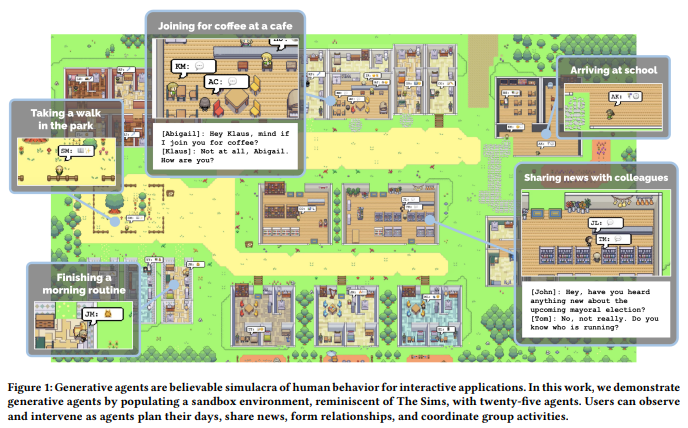Generative Agents
Interactive Simulacra of Human Behavior

Paper
Code
- https://gist.github.com/mberman84/d40d3e5c0e649d26dcd3dd0163e9d8d0
- https://github.com/joonspk-research/generative_agents
Related Video(s)
- https://www.youtube.com/watch?v=sGf5g0c-7WQ&ab_channel=MatthewBerman
- https://www.youtube.com/watch?v=Se6KFn1Nni4&ab_channel=MatthewBerman
Believable proxies of human behavior can empower interactive applications ranging from immersive environments to rehearsal spaces for interpersonal communication to prototyping tools. In this paper, we introduce generative agents–computational software agents that simulate believable human behavior.
Generative agents wake up, cook breakfast, and head to work; artists paint, while authors write; they form opinions, notice each other, and initiate conversations; they remember and reflect on days past as they plan the next day.
To enable generative agents, we describe an architecture that extends a large language model to store a complete record of the agent’s experiences using natural language, synthesize those memories over time into higher-level reflections, and retrieve them dynamically to plan behavior. We instantiate generative agents to populate an interactive sandbox environment inspired by The Sims, where end users can interact with a small town of twenty five agents using natural language.
In an evaluation, these generative agents produce believable individual and emergent social behaviors: for example, starting with only a single user-specified notion that one agent wants to throw a Valentine’s Day party, the agents autonomously spread invitations to the party over the next two days, make new acquaintances, ask each other out on dates to the party, and coordinate to show up for the party together at the right time.
We demonstrate through ablation that the components of our agent architecture–observation, planning, and reflection–each contribute critically to the believability of agent behavior. By fusing large language models with computational, interactive agents, this work introduces architectural and interaction patterns for enabling believable simulations of human behavior.
Summary from ChatGPT-4
Revolutionizing Virtual Worlds: Meet the Next Generation of Smart Sims!
TL;DR: New software agents, inspired by popular games like The Sims, can mimic authentic human behavior, make decisions, remember past experiences, and plan their day-to-day lives - all using the power of advanced language models!
Key Points:
What are these agents? Picture a virtual person that gets up, prepares breakfast, goes to work, paints if they’re an artist, or writes if they’re an author. Just like us, they have opinions, make friends, and even chat about their day. These virtual beings are what we call generative agents.
The Magic Behind the Curtain These agents are powered by an advanced system that remembers their experiences in a diary-like format, thinks back on them, and uses these memories to plan future actions. Imagine a digital brain that records every action and uses it to shape future behaviors.
Gaming Brought to Life Imagine stepping into a game, not unlike The Sims, where you can interact with 25 of these agents in real-time. Instead of pre-defined actions, these agents will react based on their past experiences and your interactions.
Why This is Huge Previous virtual characters often followed strict patterns, making them predictable. These new agents break the mold, reacting and planning dynamically, making the virtual world feel more real than ever.
Here we’re blending the power of state-of-the-art language models with the fun of interactive gaming to create an experience that’s dynamic, engaging, and incredibly believable! This could redefine how we design and experience virtual worlds.
This is really exciting! I remember seeing this demo earlier this year. I feel 2024 will be an exciting year for gaming breakthroughs. I am looking forward to this new age of advanced video game AI.
The only thing holding back agents like these is how computationally expensive this all is. I saw this video a few days ago too.

